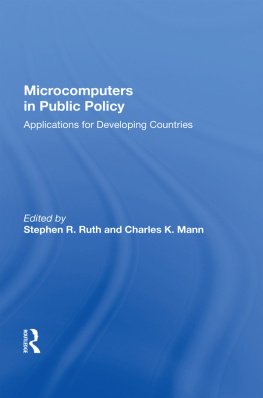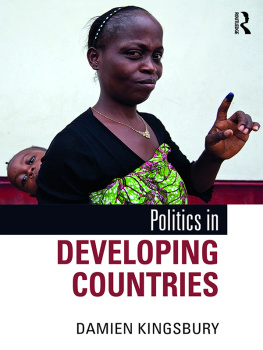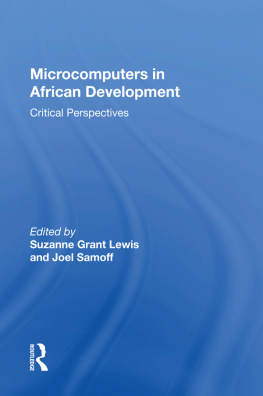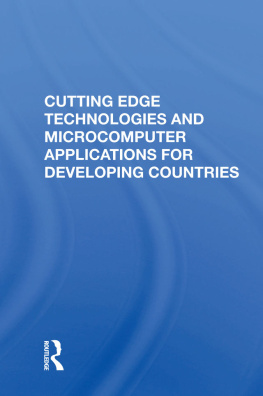
MICROCOMPUTERS AND THEIR APPLICATIONS FOR DEVELOPING COUNTRIES
About the Book
Microcomputers are an increasingly important tool in all aspects of development as the need to handle and assimilate vast quantities of information becomes ever more critical for both the international development community and the developing countries. In addition, the microcomputer represents the first significant technological advance that a developing country can assimilate and exploit with a relatively low capital investment and without prior knowledge or involvement in other technologies. Unfortunately this new technology represents not only an opportunity if properly exploited but a threat if ignored. The widespread and increasing incorporation of microcomputers into all aspects of the developed countries represents a major technological advance and an inevitable social change. If a developing country fails to take advantage of the opportunity that microcomputer technology represents, its level of development in relation to developed countries will be significantly lowered.
Organized by the Board on Science and Technology for International Development in response to a request from the U.S. Agency for International Development, this book is an overview of microcomputer applications in developing countries and the issues associated with their use and abuse. The first section of the book is an assessment of the need for microcomputers in development. Written primarily for those in the development field and other computer-literate individuals, the second part is divided into applications in agriculture, health, energy, and municipal management. Policy concerns are addressed in the final section. It discusses the technology transfer that takes place as countries try to establish national computer policies that meet local needs while encouraging creative and useful applications.
Published in cooperation with the Board on Science and Technology for International Development, Office of International Affairs, National Research Council
Microcomputers and their Applications for Developing Countries
Report of an
Ad Hoc Panel
on the Use of
Microcomputers for
Developing Countries
First published 1986 by Westview Press, Inc.
Published 2018 by Routledge
52 Vanderbilt Avenue, New York, NY 10017
2 Park Square, Milton Park, Abingdon, Oxon OX14 4RN
Routledge is an imprint of the Taylor & Francis Group, an informa business
Copyright 1986 by the National Academy of Sciences
All rights reserved. No part of this book may be reprinted or reproduced or utilised in any form or by any electronic, mechanical, or other means, now known or hereafter invented, including photocopying and recording, or in any information storage or retrieval system, without permission in writing from the publishers.
Notice:
Product or corporate names may be trademarks or registered trademarks, and are used only for identification and explanation without intent to infringe.
Library of Congress Catalog Card Number: 86-50731
ISBN 13: 978-0-367-01080-5 (hbk)
NOTICE: The project that is the subject of this report was approved by the Governing Board of the National Research Council, whose members are drawn from the councils of the National Academy of Sciences, the National Academy of Engineering, and the Institute of Medicine. The members of the committee responsible for the report were chosen for their special competences and with regard for appropriate balance.
This report has been reviewed by a group other than the authors according to procedures approved by a Report Review Committee consisting of members of the National Academy of Sciences, the National Academy of Engineering, and the Institute of Medicine.
The National Research Council was established by the National Academy of Sciences in 1916 to associate the broad community of science and technology with the Academy's purposes of furthering knowledge and of advising the federal government. The Council operates in accordance with general policies determined by the Academy under the authority of its congressional charter of 1863, which establishes the Academy as a private, nonprofit, self-governing membership corporation. The Council has become the principal operating agency of both the National Academy of Sciences and the National Academy of Engineering in the conduct of their services to the government, the public, and the scientific and engineering communities. It is administered jointly by both Academies and the Institute of Medicine. The National Academy of Engineering and the Institute of Medicine were established in 1964 and 1970, respectively, under the charter of the National Academy of Sciences.
The Board on Science and Technology for International Development (BOSTID) of the Office of International Affairs addresses a range of issues arising from the ways in which science and technology in developing countries can stimulate and complement the complex processes of social and economic development. It over-sees a broad program of activities with scientific organizations in developing countries, and examines ways to apply science and technology to problems of economic and social development through various programs, research grants, studies, advisory committees, workshops, and other mechanisms. BOSTID's Advisory Committee on Technology Innovation publishes topical reviews of technical processes and biological resources of potential importance to developing countries.
This report has been prepared by an ad hoc advisory panel of the Advisory Committee on Technology Innovation, Board on Science and Technology for International Development, Office of International Affairs, National Research Council and has been funded by the Office of the Science Advisor, Agency for International Development, under Grant No. DAN-5538-G-SS-1023-00.
Panel on Microcomputers for Developing Countries
WILLIAM J. LAWLESS, JR., Cognitronics Corporation, Stamford, Connecticut, Chairman
JAMES S. McCULLOUGH, Research Triangle Institute, Research Triangle Park, North Carolina, Vice Chairman
RUTH M. DAVIS, The Pymatuning Group, Inc., Arlington, Virginia
BARBARA DISKIN, International Statistical Program Center, Bureau of the Census, U.S. Department of Commerce, Washington, D.C.
NATHANIEL FIELDS, Institute for International Development, Vienna, Virgina
HARRY HUSKEY, Board of Studies in Computer and Information Sciences, University of California, Santa Cruz, California
DONALD T. LAURIA, Department of Environmental Sciences and Engineering, School of Public Health, University of North Carolina, Chapel Hill, North Carolina
HAROLD LIEBOWITZ, School of Engineering and Applied Sciences, The George Washington University, Washington, D.C.
KURT D. MOSES, International Division, Academy for Educational Development, Washington, D.C.
MOHAN MUNASINGHE, Energy Department, The World Bank, Washington, D.C.
PHILIP F. PALMEDO, International Resources Group, Setauket, New York
KILUBA PEMBAMOTO, McDonald Douglas Corp., Chevy Chase, Maryland
ROBERT TEXTOR, Department of Anthropology, Stanford University, Stanford, California
MICHAEL WEBER, Department of Agricultural Economics, Michigan State University, East Lansing, Michigan
KARL WIIG, Arthur D. Little Inc., Cambridge, Massachusetts








![RachelLeach - Developing Backbone.js applications: [building better JavaScript applications]](/uploads/posts/book/229199/thumbs/rachelleach-developing-backbone-js-applications.jpg)

